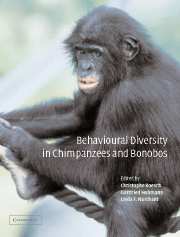Book contents
- Frontmatter
- Contents
- List of contributors
- Preface
- Behavioural Diversity in Pan
- PART I BEHAVIOURAL FLEXIBILITY
- PART II SOCIAL RELATIONS
- INTRODUCTION
- 6 Factors influencing fission–fusion grouping in chimpanzees in the Taï National Park, Côte d'Ivoire
- 7 Ecological and social correlates of chimpanzee party size and composition
- 8 Agonistic relations among Kanyawara chimpanzees
- 9 Relationships of male chimpanzees in the Budongo Forest, Uganda
- 10 Dynamics in social organization of bonobos (Pan paniscus)
- PART III FEMALE STRATEGIES
- PART IV HUNTING AND FOOD SHARING
- PART V GENETIC DIVERSITY
- Index
9 - Relationships of male chimpanzees in the Budongo Forest, Uganda
Published online by Cambridge University Press: 08 February 2010
- Frontmatter
- Contents
- List of contributors
- Preface
- Behavioural Diversity in Pan
- PART I BEHAVIOURAL FLEXIBILITY
- PART II SOCIAL RELATIONS
- INTRODUCTION
- 6 Factors influencing fission–fusion grouping in chimpanzees in the Taï National Park, Côte d'Ivoire
- 7 Ecological and social correlates of chimpanzee party size and composition
- 8 Agonistic relations among Kanyawara chimpanzees
- 9 Relationships of male chimpanzees in the Budongo Forest, Uganda
- 10 Dynamics in social organization of bonobos (Pan paniscus)
- PART III FEMALE STRATEGIES
- PART IV HUNTING AND FOOD SHARING
- PART V GENETIC DIVERSITY
- Index
Summary
INTRODUCTION
Relationships between individuals are essentially the product of individual efforts to cope with environmentally imposed selection pressures in a social context. They emerge from repeated interactions between individuals, providing the social structure within which the individuals operate (Hinde 1976). In chimpanzees (Pan troglodytes), this structure is especially fluid (Goodall 1965; Reynolds & Reynolds 1965; Nishida 1979). The relationships that an adult male chimpanzee has with other males within his community appear to be both key components in the struggle for high social status within a community, and crucial for successful inter-community territorial encounters (Bygott 1979; Wrangham & Smuts 1980; Wrangham 1986; Nishida & Hosaka 1996; Boesch & Boesch-Achermann 2000). High social status is thought to increase the ability of males to monopolise females and so achieve higher mating success (Sugiyama & Koman 1979; Tutin 1979; Hasegawa & Hiraiwa-Hasegawa 1983). In social situations where a single male may not be able to monopolise access, a pair of males may be able to do so, providing a direct mating benefit to the cooperating males (Goldberg & Wrangham 1997; Watts 1998). Relationships may also provide proximate benefits beyond support in agonistic confrontations, which may, in turn, lead to higher social status, and serve to reduce both social tension and individual stress (Kawanaka 1990; de Waal 1996).
Despite the value of cooperative relationships to male chimpanzees, they appear to show little long-term loyalty to one another and can be extremely fickle in their allegiances (Nishida 1983; Uehara et al. 1994; Nishida & Hosaka 1996).
- Type
- Chapter
- Information
- Behavioural Diversity in Chimpanzees and Bonobos , pp. 125 - 137Publisher: Cambridge University PressPrint publication year: 2002
- 17
- Cited by



